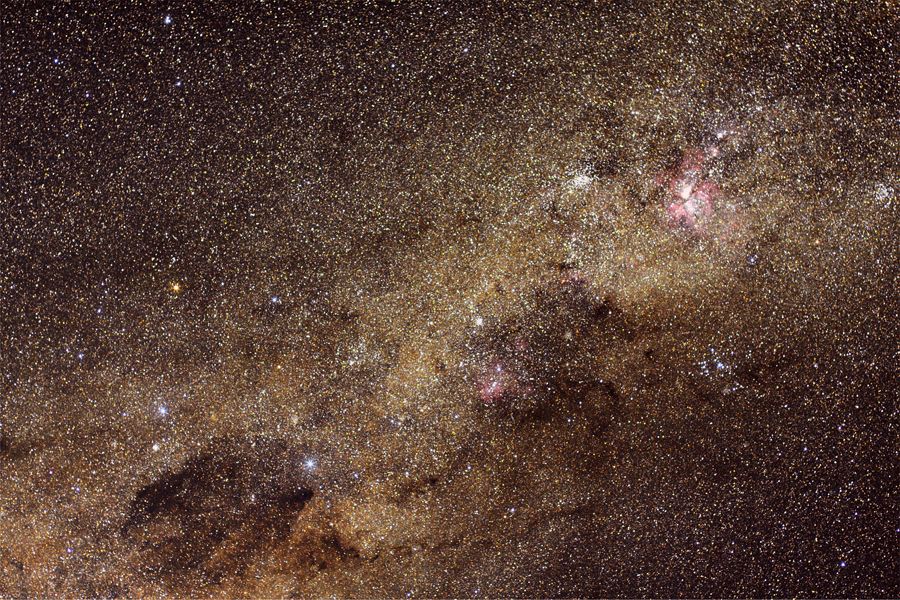The Southern Cross (Crux) and Eta Carinae Nebula (NGC 3372) in Carina - 1/06

The Southern Cross is located in the constellation of Crux, the smallest of the 88 constellations. The four stars that mark the famous Southern Cross asterism are Mimosa/Becrux, Gacrux, Acrux and Delta Crucis.
Crux may be the smallest of all the constellations, however, it is also the most recognisable. The long arm of the cross points to the South Celestial Pole, which, unlike the northern hemisphere, has no bright star (Polaris) to mark it. Crux is on both the Australian and New Zealand flags.
The Eta Carinae Nebula is the largest and most beautiful diffuse nebula in the sky, surpassing even The Great Orion Nebula (M42) in size and grandeur. Only its position far south of the celestial equator (and, hence, its invisibility in much of the northern hemisphere) prevents this nebula from being a household name.
The nebula is a massive star-forming region of hot gas, heated by ultraviolet rays from the hot young stars. It covers a full two degrees of sky (four times the width of the full moon). Eta Carinae is obvious to the naked eye as a bright, elongated glow, but that only hints at its telescopic splendour. In binoculars it is a large and bright nebulosity split in half by a V-shaped dark lane, which is called the Keyhole Nebula. The field of view in bincoulars is just stunning with Eta Carinae embedded in a star-studded region of the Milky Way. A telescope will reveal wisps of nebulosity, dark lanes, and subtle detail that will keep most observers busy for years.
The two open clusters that flank the Eta Carinae Nebula are NGC 3532 and NGC 3114. The star at the centre of the nebula is a unique story in its own right. Eta Carinae is one of the biggest stars, 100 times the mass of our own sun. It emits 4 million times as much light as our sun. Eta Carinae is a highly unstable star which fluctuates greatly in brightness. It will most likely explode as a supernova, perhaps in our lifetime.
Nowadays, the star is at the edge of naked eye visibility, but an outburst in the mid-18th century temporarily made Eta Carinae the second brightest star in the night sky, following only Sirius. This outburst ejected gas which now surrounds the central star and is known as the Homunculus Nebula.
This composite consists of one set of images; one set of 25 images taken at ISO-1600.
Each individual image was a 30 second exposure.
IRIS was used to calibrate each image (dark subtraction [median combined master dark] and flat field division [median combined master flat {lights, darks and offsets}]), to register, align, and finally stack.
Photoshop CS2 was used to adjust levels, curves, brightness, contrast, saturation, frame and resize the final composite.
Observed closely, diffraction spikes can be seen on the brightest stars.
Target: The Southern Cross (Crux) and Eta Carinae Nebula in Carina
Date: Sunday, January 29th, 2006
Time: First image: 4:47 AM
Time: Last image: 5:02 AM
Location: Lostock, NSW, Australia
Camera: Canon EOS-350D (unmodified)
Lens: Canon EF 50mm F/1.4 (stopped down to F/2.5)
Focal length: 50mm
Mount: Piggy-backed onto an 8" Meade LX90 LNT (F/10)
Alignment: Equatorial; via equatorial wedge
Exposure: 25 x 30 seconds @ ISO-1600 (RAW)
Software: IRIS: Calibration, registration, stacking; Adobe Photoshop CS2: post-processing and framing
Congratulations @humayun.qureshi! You received a personal award!
You can view your badges on your Steem Board and compare to others on the Steem Ranking
Do not miss the last post from @steemitboard:
Vote for @Steemitboard as a witness to get one more award and increased upvotes!
Congratulations @humayun.qureshi! You received a personal award!
Click here to view your Board